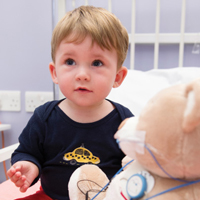Co-ordinated treatment - Sam's story
One-year-old Sam Gambi was diagnosed with Prader-Willi syndrome, a rare genetic condition, shortly after his birth at Queen Charlotte’s Hospital, Hammersmith.
His mother, Jo, explains: “We knew within 24 hours of his birth that there was something wrong with Sam. Compared to our older son, Ben, Sam was very different at birth. Although the doctors suspected Sam had Prader-Willi syndrome within a day or so, it was only confirmed after about eight weeks. While my husband and I waited for the test results, we banned ourselves from Googling anything. But, ultimately we couldn’t protect ourselves from the enormous shock and sadness when we received Sam’s diagnosis, or from our fears for the future.”

Prader-Willi syndrome causes a wide range of symptoms, the main ones being a constant feeling of hunger and the desire to eat, which can easily lead to dangerous weight gain. Other features of the syndrome include low muscle tone, learning difficulties, challenging behaviour/autism, abnormal metabolism and growth, and a range of medical issues.
A community team, including a paediatrician, physiotherapist, occupational therapist, speech and language therapist and dietitians, was put in place for Sam and his family. He was also referred to an endocrinologist, who specialises in the treatment of hormone disorders, at Chelsea and Westminster Hospital. Sam saw this specialist regularly in his first year.
Another risk for patients with Prader-Willi syndrome is respiratory problems, in particular, whilst sleeping.
Sam was referred from Chelsea and Westminster to the specialist children’s sleep centre at Royal Brompton for a sleep study under the care of Dr Hui-Leng Tan, consultant in paediatric respiratory and sleep medicine.
Jo explains: “It was such a smooth process. We were really impressed by the efficient communication between the two hospitals. I’ve also been in regular email contact with Dr Tan – who is excellent and very reliable, so I trust her and feel free to ask her anything.”
On Sam’s first visit, his oxygen and carbon dioxide levels were monitored while he slept, as well as heart rate, chest and abdominal movement and airflow. He was found to have sleep-disordered breathing with many central apnoeas, where the brain does not get the message to the lungs to breathe during sleep. Sam’s parents were given a supply of oxygen and taught how to give it to Sam at night time so that he could breathe properly while asleep.
Since his first sleep study, Sam has returned to the sleep centre a further three times. He has started growth hormone treatment for his condition to help with his growth and muscle tone. However, a common side effect of this is that the adenoids and tonsils grow larger, which could also make it hard for him to breathe at night so he needs regular studies to see if this is happening.
Jo said: “The sleep centre is lovely; such a pleasant environment. It makes our time in hospital so much easier. Sam is fascinated by the artwork and it really helps that I can stay in the same room with him. He loves the sleep centre bear, Humphrey, and the staff are always warm, friendly and efficient.”
Dr Tan commented: “Sam is a lovely young boy and a real pleasure to treat. We will need to closely monitor him as he gets older – children with Prader-Willi syndrome are at increased risk of sleep-disordered breathing, which can be potentially dangerous if not managed correctly. It really helps for patients who need to come in repeatedly that they have a pleasant, homely environment so they have a more natural sleep.”
Jo continued: “I feel totally involved in Sam’s care here. Dr Tan and the staff have welcomed me as a parent and encouraged me to make decisions. I really feel part of the team. We’re all working towards the best possible care and treatment for Sam, which helps us feel so much more positive about this aspect of Sam’s future.”
